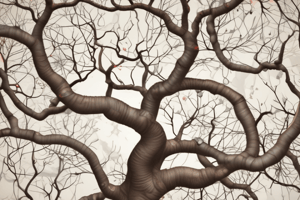Podcast
Questions and Answers
What is the primary function of the mitochondria in a cell?
What is the primary function of the mitochondria in a cell?
- To contain genetic material
- To regulate what enters and leaves the cell
- To synthesize proteins
- To generate energy for the cell (correct)
Which branch of biology focuses on the study of heredity and variation?
Which branch of biology focuses on the study of heredity and variation?
- Genetics (correct)
- Molecular Biology
- Ecology
- Zoology
Which biological process converts light energy into chemical energy?
Which biological process converts light energy into chemical energy?
- Photosynthesis (correct)
- Respiration
- Meiosis
- Fermentation
What is the role of ribosomes in a cell?
What is the role of ribosomes in a cell?
Which factor represents the non-living components of an ecosystem?
Which factor represents the non-living components of an ecosystem?
What is natural selection?
What is natural selection?
Which biomolecule primarily serves as an energy storage component?
Which biomolecule primarily serves as an energy storage component?
Which of the following is involved in protein modification and transport?
Which of the following is involved in protein modification and transport?
Flashcards are hidden until you start studying
Study Notes
Branches of Biology
- Botany: study of plants
- Zoology: study of animals
- Microbiology: study of microorganisms (bacteria, viruses, fungi)
- Ecology: study of interactions between organisms and their environment
- Biochemistry: study of chemical processes within living organisms
- Molecular Biology: study of structure and function of molecules (DNA, proteins, etc.)
- Cell Biology: study of structure and function of cells
- Genetics: study of heredity and variation
- Evolutionary Biology: study of evolution and diversity of life
- Biophysics: study of physical principles underlying biological processes
Cell Structure and Function
- Cell membrane: regulates what enters and leaves the cell
- Cytoplasm: gel-like substance inside the cell membrane
- Nucleus: contains genetic material (DNA)
- Mitochondria: generate energy for the cell
- Ribosomes: site of protein synthesis
- Lysosomes: contain digestive enzymes
- Golgi apparatus: involved in protein modification and transport
- Cytoskeleton: provides structural support and shape to the cell
Biomolecules
- Carbohydrates: energy source, structural components (cellulose, starch)
- Proteins: structural, functional, and regulatory roles (enzymes, hormones)
- Lipids: energy storage, structural components (cell membrane)
- Nucleic Acids: genetic material (DNA, RNA)
Biological Processes
- Photosynthesis: conversion of light energy into chemical energy
- Respiration: conversion of chemical energy into ATP
- Fermentation: anaerobic breakdown of glucose
- Mitosis: process of cell division
- Meiosis: process of gamete formation
- Gene expression: process of converting DNA into proteins
Evolution
- Natural Selection: process by which populations adapt to their environment
- Speciation: process by which new species emerge
- Mutation: changes in DNA sequence
- Genetic Drift: random changes in gene frequency
- Gene Flow: movement of genes between populations
Ecosystems
- Biotic Factors: living components (organisms, populations, communities)
- Abiotic Factors: non-living components (light, temperature, water, soil)
- Ecosystem Services: benefits provided by ecosystems (oxygen production, nutrient cycling)
- Food Webs: networks of predator-prey relationships
- Nutrient Cycles: pathways by which nutrients are recycled through ecosystems
Branches of Biology
- Botany: Involves the study of various aspects of plant life.
- Zoology: Focuses on the biological study of animals and their behaviors.
- Microbiology: Examines microorganisms including bacteria, viruses, and fungi.
- Ecology: Investigates the relationships and interactions between organisms and their environments.
- Biochemistry: Analyzes the chemical processes that occur within living organisms.
- Molecular Biology: Studies the structure and function of biological macromolecules like DNA and proteins.
- Cell Biology: Explores the structure, function, and behavior of cells.
- Genetics: Examines heredity, variation, and the role of genes in living organisms.
- Evolutionary Biology: Studies the mechanisms and effects of evolution and the diversity of life.
- Biophysics: Integrates principles of physics and biology to understand biological processes.
Cell Structure and Function
- Cell Membrane: Acts as a selective barrier, controlling substance entry and exit.
- Cytoplasm: Gel-like matrix where cellular components are suspended and biochemical reactions occur.
- Nucleus: Houses the cell's genetic material (DNA) and regulates gene expression.
- Mitochondria: Powerhouses of the cell that generate ATP through cellular respiration.
- Ribosomes: Sites where proteins are synthesized by translating messenger RNA.
- Lysosomes: Contain enzymes for digestion and degradation of waste materials.
- Golgi Apparatus: Modifies, sorts, and packages proteins for secretion or use within the cell.
- Cytoskeleton: Provides mechanical support, maintains cell shape, and facilitates movement.
Biomolecules
- Carbohydrates: Serve as energy sources and structural elements (e.g., glucose, cellulose).
- Proteins: Functions vary widely, including catalysis (enzymes) and signaling (hormones).
- Lipids: Essential for energy storage, signaling, and forming cell membranes.
- Nucleic Acids: Include DNA and RNA, responsible for storing and transmitting genetic information.
Biological Processes
- Photosynthesis: Process by which plants convert sunlight into chemical energy stored in glucose.
- Respiration: Series of metabolic processes that convert biochemical energy from nutrients into ATP.
- Fermentation: Anaerobic process that breaks down glucose to extract energy, producing byproducts like ethanol or lactic acid.
- Mitosis: A type of cell division resulting in two identical daughter cells, important for growth and repair.
- Meiosis: Specialized cell division that produces gametes with half the genetic material, crucial for sexual reproduction.
- Gene Expression: Process by which information from a gene is used to synthesize functional gene products, mainly proteins.
Evolution
- Natural Selection: Mechanism through which advantageous traits become more common in a population.
- Speciation: Process leading to the development of new species due to evolutionary changes.
- Mutation: Permanent alterations in the DNA sequence that can lead to genetic variation.
- Genetic Drift: Random changes in allele frequencies within a population, influencing evolution.
- Gene Flow: Transfer of genetic material between populations, contributing to genetic diversity.
Ecosystems
- Biotic Factors: Include all living elements that affect the ecosystem, such as species interactions.
- Abiotic Factors: Non-living environmental variables, including sunlight, temperature, and soil composition.
- Ecosystem Services: Benefits ecosystems provide to humans, including clean air and water, pollination, and climate regulation.
- Food Webs: Interconnected networks of feeding relationships in an ecosystem, illustrating energy flow.
- Nutrient Cycles: The movement and recycling of nutrients through biological and physical components of ecosystems.
Studying That Suits You
Use AI to generate personalized quizzes and flashcards to suit your learning preferences.




